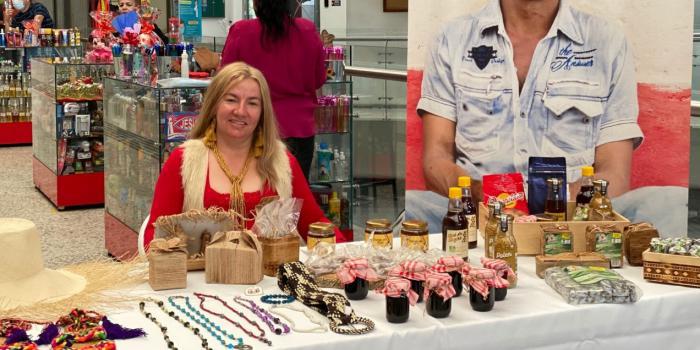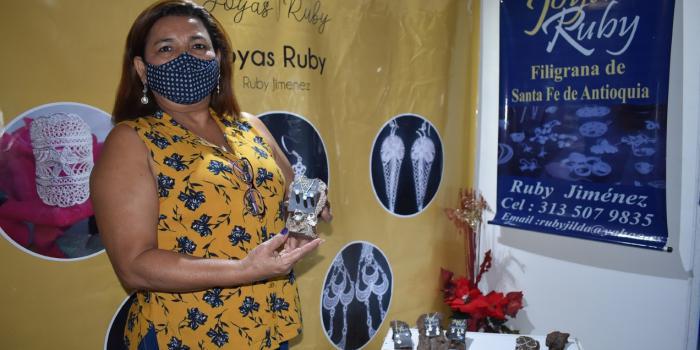
Entrepreneurial victims from nine departments arrive at the Flower Fair
With handicrafts, jewelry, leather goods, goldsmiths, and confectionery, 20 conflict victims show their work in the first version of Made in Peace Entrepreneurship at Medellin’s Flower Fair.


With resilience and business ideas, this is how they rebuild their life projects after overcoming victimizing events such as the murder of family members or the loss due to forced displacement, which are events suffered in regions harmed by the armed conflict in Colombia.
20 victims reemerged as small new entrepreneurs and arrived at Medellin supported by the Unit for the Victims with 10 productive projects. The goal was to be in the first version of Made in Peace Entrepreneurship as part of the Flower Fair.
Coming from Antioquia, Choco, Risaralda, Casanare, Nariño, Bolivar, Boyaca, Norte de Santander and Cesar, they arrive in the Antioquia capital with a sample of their resilience, as well as products ranging in jewelry, footwear, handicrafts, indigenous art, leather goods, goldsmiths, and confectionery.
Thanks to the Unit for the Victims and the Medellin Mayor's Office work, this entrepreneur group will exhibit their products between August 14th and 17th at Escenario Colombia, located in Parques del Rio, along with other demobilized projects from illegal armed groups, ex-convicts, and teenagers in rehabilitation process; 56 participants in total.
Ruby Jimenez is one of the victims. Ten years ago, she was displaced to Santa Fe de Antioquia due to guerrillas and paramilitary groups confrontations. There, she had to start from scratch, which led her to learn the trade of spinning silver fabrics as a new job opportunity.
Luego se radicó en Medellín donde, además de la ayuda humanitaria de la Unidad para las Víctimas, se benefició del programa de fortalecimiento a iniciativas productivas para hacer realidad su negocio de Joyas Ruby.
Then she settled in Medellin where, in addition to the Humanitarian Aid from the Unit, she benefited from the Productive Initiatives Strengthening Program to make her “Ruby Jewelry” business a reality.
“Being in the Flower Fair gives me pride because it provides income to improve my family's life quality and the production of my business,” she says excited.
And remembering the road she endured until this point, she recognizes: "I feel blessed with this support that I had for my business. I started it with the first economic strengthening by the unit for the Victims and the Mayor's Office; I have moved on."
The business ventures
According to the Unit for the Victims’ Antioquia’s Territorial Director, Wilson Cordoba Mena, “a strengthening route and public-private alliances has been generated. This was done to promote victims’ enterprises so they grow to be productive again, which is one of the ways they can achieve their dreams.”
In addition, he stressed that the Flower Fair is a great stage for them to show their products and expand their businesses towards success, "because we need more autonomous and entrepreneurial victims."
Con la estrategia de fortalecimiento de emprendimientos de víctimas se han identificado 10.865 proyectos productivos en todo el país, los cuales se benefician con capacitación en mercadeo, talento humano, producción y operación, apoyo financiero y formalización legal. También con participación en ferias comerciales.
With the victims' enterprises strengthening strategy, 10,865 productive projects have been identified throughout the country, which benefit from marketing training, human talent, production and operation, financial support, and legal formalization; this also entails participation in trade fairs such as the Flower Fair.
These are the resilient victims’ productive projects Made in Peace Entrepreneurship at Medellin’s Flower Fair:
La Casa de las Abejas (The Bees’ House)
Antioquia’s mountains scent is part of the gamble the productive project La Casa de las Abejas gathers daily from La Ceja (Antioquia). Its work team, like bees, laboriously adds to peace building.
Saenz Leather
From the tradition learned from the Mr. Valerio Saenz hands, this family from Casanare works and weaves leather creating innovative design pieces. Each of their pieces shows this project’s drive and strength, comparing the leather’s temperance with tenacity to overcome violence.
Tejedoras de Paz
Weaving hats, Muisca craft women have been betting on peace from the south of the country, investing, in each knot, the will to maintain the tradition of the iraca palm typical hats of La Cruz, Nariño.
Calzado LuisFer
Detail and gratitude are two elements LuisFer Calzado draws from to create sandals in Cartagena. Each of the shoes they make are directly linked to the idea of fashion, diversity and detail needed to compete in this productive sector.
Artesanias El Lago
Hats, “ruanas” and gloves have always been part of clothing required for cold weather. Artesanias El Lago (originally from Paipa, Boyaca) is part of the enterprises that continue to bet on the stylish wool tradition.
Tienda cafe de la paz
This is a strategic and inclusive initiative to make visible and strengthen sustainable production and fair commercialization of Risaralda’s armed conflict victims’ organizations products.
Late Choco
This project is built as part of the use of cocoa in its natural state recovery, diversifying its productivity and flavor. This Chocoan project can be identified by its colors and the use of multiple typical fruits of our country.
Lampe Orfebreria
It is a company devoted to design and manufacture of contemporary jewelry in Norte de Santander. From Cucuta, it has established a recovery and goldsmith progress path.
Asoarka
The promotion of the strengthening and economic, cultural, and social development of the Kankuama ethnic group craft women is reflected in the manufacture of typical “mochilas”, promoting the country’s indigenous cultures preservation.
(End/JCM/COG/RAM)






